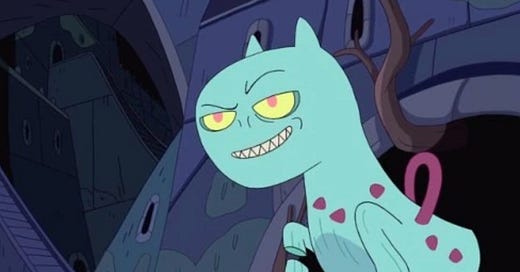
Photo owned by Cartoon Network
“Greetings, Frank the Human Boy,” purrs the guardian of the Dungeon of the Crystal Eye, narrowing its piss-yellow eyes. I misremembered this animal as a sphinx, but he’s unmistakably a cat, even with the purple tentacles sprouting from his back. We see his tongue first, an orange kitten-head that slithers sweetly from the mouth of the bony, blue beast, luring Finn forward. And yes, the Human Boy in question? The only one left in Ooo? We still call him Finn.
“How did you almost know my name?!” Finn cries, genuinely impressed.
The beast raises one eyebrow, and smiles. “I have approximate knowledge of many things.”
The episode “Dungeon” is the eighteenth episode of Adventure Time’s first season. Finn wants to prove that, as an adventurer, he doesn’t need Jake’s help. Princess Bubblegum does make an appearance, but “Dungeon” remains one of Adventure Time’s most stereotypically masculine episodes. A lot of the first season is like this, focusing mainly on the dynamic between Finn and Jake. When I rewatch old episodes, I’m hard-pressed to go farther back than Season 2; it was then the creators grew confident in which supporting characters had staying power, and started building the storylines they deserved. In humor and in art style, the first season was often broad or unpolished, a child trying on personalities. Still, if you asked me for the funniest moment from my favorite TV show, it’s this scene, when Finn’s in the Dungeon.
“For instance,” the demon cat goes on, “I know that I am possibly going to slay you and much on your eyeballs.”
Humor me: When you have OCD, you are plagued by the possible. Doubt is a poisoned wish. Moment to moment, your mind swims with all that could happen. What if? Combine this with transsexualism, for which a cis person will inevitably ask you, are you sure? This will come from your parent, or medical provider, or some cis queer who finds your whole “gender thing” hitting a little too close to home. After all, you’re changing reality; people want you to know. So, you turn the question on yourself, like a rusty old knife. Are you sure? Then, seconds later: But what if...?
I am pathetic and small at Knowing’s gate, desperate for entry, glued to Reddit threads about dysphoria as I check for feelings of recognition. Certainty is my white whale. Unsurprisingly, I am often attracted to those who know things, or at least appear to know things. My wife would sooner return our tentacle-less cat to the Humane Society than second-guess herself, but she’s also an elementary school teacher; she has perfected a knowing aesthetic. You can’t picture her wrong about something, even when she is. The glasses don’t help.
But this demon cat, so proud of his approximations! His voice is thick, syrupy, and terrifying, the demon cat equivalent of Vincent Price. He knows he does not know. His lack of knowing does not limit his power; it is his power. Later, Finn encounters the cat again.
“You can’t hide from me, Jim! I know almost everything, remember? I know exactly where you might be, Jim!”
The punchline, of course, is that approximations don’t yield results. Finn hides behind a boulder as the demon cat pounces on every other nearby hiding place (“Aw, man! I thought you’d be behind this rock…”). Still, Finn is scared, a rare emotion for him, except when confronted with the ocean. Why? The demon cat is smaller than Finn’s typical foe, and significantly less effective. However, there is something uncanny, if not supernatural, about one who brandishes their ignorance so fiercely.
In addition to being trans and having OCD, my memory is terrible, as I’ve externalized it via Internet: I take tons of pictures, Google and Wikipedia everything. This, paired with getting stoned every day for three out of the four years I spent in college, has given me strong impressions of a great many topics-- Aristotle, Jennifer Hudson’s music career, the plot of Game of Thrones-- but no hard data. I do not feel comfortable speaking off the cuff about anything regarded as fact, and I do not have a knowing aesthetic. The cissexist consciousness regards trans men as “confused” women, and the Jews ask too many questions. Sometimes, my systemically-lost-puppy vibe disarms people; they see they don’t have to use regular channels to impress me. Other times, this repulses. I’m blinked at, then forgotten.
I’m not proud of my obstacles to knowing. I’m a writer, and the wisdom is to “write what you know.” But what if you don’t know anything? And how do we talk about what we choose not to know, or once knew, or are on the brink of knowing? What is the voice we use to acknowledge the gaps in our mind? Could unenlightenment be powerful, self-assured, even frightening in its honesty?
No? Well. At least it’s funny.


